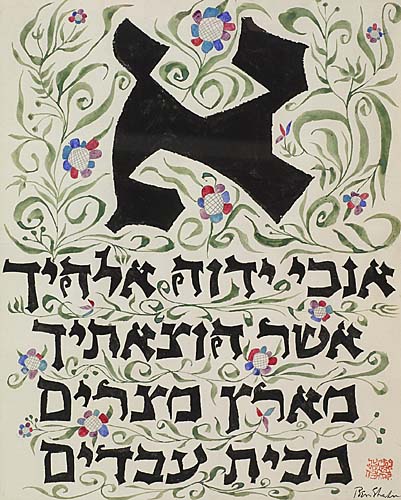
The book of Exodus is the foundational document of Israel’s national history. Here, we find the events that, more than any others, have shaped Jewish sentiments and attitudes: the narrative of the Exodus from Egypt and the making of the covenant at Mount Sinai.
Through later interpretations, the experiences of the Exodus generation were knitted into this book in what arguably is a literary masterpiece and one of the great meta stories of the Western world.
The book’s purpose was not to have readers discuss who the pharaoh was or some other piece of historical trivia. But, in German Egyptologist Jan Assman’s words, it addressed “the two most important questions on which human minds have dwelled since time immemorial: the question of the role played by the divine in our lives and the question of who “we” are.”
Four-hundred and thirty years, to be exact- “Shemot,” as the book is called in Hebrew, tells us- the people of Israel lived in Egypt. Yet, William Propp- considered the book’s preeminent scholar-wants us to notice that:
“The four centuries in Egypt pass without a tale worth telling. As with much of Israel’s desert period and the later Babylonian captivity, the Bible considers this sojourn devoid of noteworthy events.”
This kind of historical “blackout” has driven critics to ask:
“What was God doing during those years the Israelites suffered under the Egyptians?”
This is one of the most severe and challenging questions asked about God repeatedly and at different moments, not only through Israel’s history but through the life of almost every faith community on earth.
After the book’s first two chapters recount how a series of calamities fell upon the Israelites in Egypt, God makes its presence known. It is this sudden appearance at the end of the book’s second chapter that highlights the previous absence, mainly when then the Israelites are harshly treated, and their newborn males are threatened with genocide.
The TaNaKh and the theologians speak about “hiddenness,” “withdrawal,” and even “disappearance” to refer to those moments when experiencing God’s presence is needed more than in any other circumstances. Yet, it is perceived as absent.
The French Jewish philosopher Andre Neher cautions, however, that:
“In the dialogue between God and human beings, silence is more than simply a pause, a hiatus without significance or content. It is as essential to understanding the revealed message as a musical pause is to understanding a piece of music. Silence is not an interruption of the word: it is its reverse, alternative, and other faces.”
The book ensures that God’s ‘silence” during those hundreds of years was not to be interpreted as hiding nor a disappearance. In fact, it was actively fulfilling the promise made to Israel’s patriarchs of multiplying their descendants “as the stars of heaven.” So the text, in its opening verses:
The sons of Israel were fruitful and swarmed and multiplied and grew very vast, and the land was filled with them
God’s promise was at work in life-giving ways all along the journey.
Exodus is one of the richest theological books of the TaNaKh, in the sense that we encounter here a broad series of texts concerning God.
“Conceptions of God,” writes Harvard theologian Gordon D. Kaufman, “are always built up out of metaphors at hand in the culture.” So, it is not that we find a definite Description of God in Exodus. What we see is God’s intentions for humanity.
“The divine revelation of the Torah,” wrote Jewish philosophy professor Norbert Max Samuelson, “is a blueprint or program for human behavior whose goal is to bring about perfection which, in some sense, God cannot bring about without human help.“ God will not be used “His” presence, and thus, power depends on human response and initiative.
“The long period of waiting in Egypt, then, has been due not to some divine quietism but to God’s waiting for the right configuration of human and natural events to put a new level of activity together with respect to this situation,” wrote Bible scholar Terence E. Fretheim.
It took Israel four hundred years to cry for help. To realize that they were living in a “civilization which spent its surplus capital to provide lavish entombment and expensive perpetual care for upper-class corpses, while the bodies of slaves were tossed to the crocodiles or into a common grave.”
The actors and specifics may have changed, but the underlying plot remains here. It makes Exodus as relevant today as it was when the need to write it was felt necessary.

